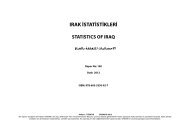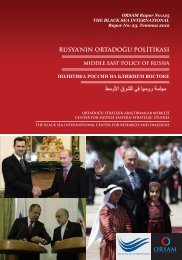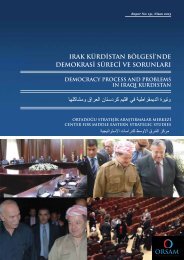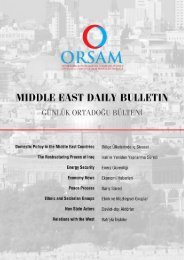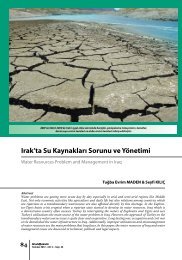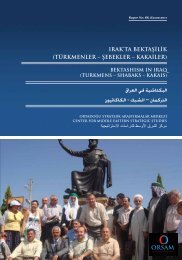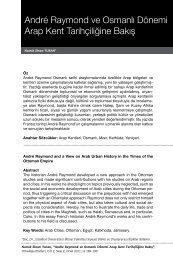Untitled - orsam
Untitled - orsam
Untitled - orsam
You also want an ePaper? Increase the reach of your titles
YUMPU automatically turns print PDFs into web optimized ePapers that Google loves.
sectarian consequences for the region in the aftermath of the 2003 Iraq War thus merit<br />
serious consideration.<br />
Dr Karasik argues at the same time that it is not clear whether the civil war unleashed by<br />
the US invasion is over.<br />
"At present, the prevailing opinion seems to be that Iraqis are "tired" of violence and<br />
now prefer a democratic process, no matter how flawed or skewed.<br />
However, voices from Saudi Arabia increasingly appear dissatisfied with the<br />
consolidation of the Iraqi state and fearful of Iranian encroachment, potentially implying<br />
a heightened Saudi-Iranian rivalry within Iraq and potentially an all-out proxy war<br />
brewing in the wake of the withdrawal of US forces over the course of 2011.<br />
On Al Qaida on the Arabian Peninsula, Dr Karasik said the Salafist-Jihadist discourse<br />
represented by Al Qaida Arabian Peninsula calls for attacks on energy infrastructure and<br />
violence against civilians, Muslim and non-Muslim.<br />
"The recent attacks on cargo carriers as an economic target is also a case in point. In<br />
addition, Al Qaida on the Arabian Peninsula doctrine calls for attacks on Gulf nations'<br />
cyberspace that can have an impact on governance and economics. Although cyberterrorism<br />
is an attractive option for terrorists, who value its anonymity and its media<br />
appeal, the increasing e-governance by the GCC makes any such potential and actual<br />
attack highly significant. Overall, such attacks can be low in sophistication but can have a<br />
high impact via psychological effects and loss of commerce and revenue.<br />
Dr Karasik said that the continued and growing reality of "threats from within" on the<br />
physical, economic and electronic infrastructure of the Gulf states must be analysed from<br />
the perspective of efforts to directly address threats through security and legal<br />
approaches as well as economic and political integration and reconciliation efforts which<br />
have taken diverse forms across the region.<br />
Sayfa 73




